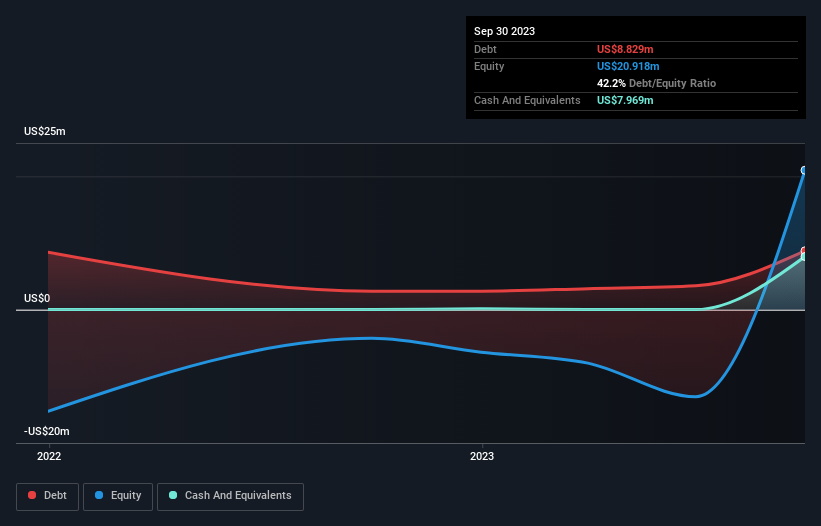
Howard Marks put it nicely when he said that, rather than worrying about share price volatility, 'The possibility of permanent loss is the risk I worry about... and every practical investor I know worries about.' When we think about how risky a company is, we always like to look at its use of debt, since debt overload can lead to ruin. As with many other companies Carmell Corporation (NASDAQ:CTCX) makes use of debt. But the more important question is: how much risk is that debt creating?
What Risk Does Debt Bring?
Debt assists a business until the business has trouble paying it off, either with new capital or with free cash flow. In the worst case scenario, a company can go bankrupt if it cannot pay its creditors. However, a more common (but still painful) scenario is that it has to raise new equity capital at a low price, thus permanently diluting shareholders. Of course, plenty of companies use debt to fund growth, without any negative consequences. When we examine debt levels, we first consider both cash and debt levels, together.
See our latest analysis for Carmell
How Much Debt Does Carmell Carry?
As you can see below, at the end of September 2023, Carmell had US$8.83m of debt, up from US$2.78m a year ago. Click the image for more detail. However, it also had US$7.97m in cash, and so its net debt is US$860.3k.

How Strong Is Carmell's Balance Sheet?
According to the last reported balance sheet, Carmell had liabilities of US$37.7m due within 12 months, and liabilities of US$23.6m due beyond 12 months. On the other hand, it had cash of US$7.97m and US$14.4m worth of receivables due within a year. So it has liabilities totalling US$38.9m more than its cash and near-term receivables, combined.
Carmell has a market capitalization of US$66.9m, so it could very likely raise cash to ameliorate its balance sheet, if the need arose. But we definitely want to keep our eyes open to indications that its debt is bringing too much risk. Carrying virtually no net debt, Carmell has a very light debt load indeed. When analysing debt levels, the balance sheet is the obvious place to start. But it is Carmell's earnings that will influence how the balance sheet holds up in the future. So if you're keen to discover more about its earnings, it might be worth checking out this graph of its long term earnings trend.
While it hasn't made a profit, at least Carmell booked its first revenue as a publicly listed company, in the last twelve months.
Caveat Emptor
Importantly, Carmell had an earnings before interest and tax (EBIT) loss over the last year. Its EBIT loss was a whopping US$10.0m. Considering that alongside the liabilities mentioned above does not give us much confidence that company should be using so much debt. Quite frankly we think the balance sheet is far from match-fit, although it could be improved with time. Another cause for caution is that is bled US$7.5m in negative free cash flow over the last twelve months. So suffice it to say we consider the stock very risky. The balance sheet is clearly the area to focus on when you are analysing debt. However, not all investment risk resides within the balance sheet - far from it. To that end, you should learn about the 5 warning signs we've spotted with Carmell (including 3 which are a bit unpleasant) .
If, after all that, you're more interested in a fast growing company with a rock-solid balance sheet, then check out our list of net cash growth stocks without delay.
If you're looking to trade Longevity Health Holdings, open an account with the lowest-cost platform trusted by professionals, Interactive Brokers.
With clients in over 200 countries and territories, and access to 160 markets, IBKR lets you trade stocks, options, futures, forex, bonds and funds from a single integrated account.
Enjoy no hidden fees, no account minimums, and FX conversion rates as low as 0.03%, far better than what most brokers offer.
Sponsored ContentNew: AI Stock Screener & Alerts
Our new AI Stock Screener scans the market every day to uncover opportunities.
• Dividend Powerhouses (3%+ Yield)
• Undervalued Small Caps with Insider Buying
• High growth Tech and AI Companies
Or build your own from over 50 metrics.
Have feedback on this article? Concerned about the content? Get in touch with us directly. Alternatively, email editorial-team (at) simplywallst.com.
This article by Simply Wall St is general in nature. We provide commentary based on historical data and analyst forecasts only using an unbiased methodology and our articles are not intended to be financial advice. It does not constitute a recommendation to buy or sell any stock, and does not take account of your objectives, or your financial situation. We aim to bring you long-term focused analysis driven by fundamental data. Note that our analysis may not factor in the latest price-sensitive company announcements or qualitative material. Simply Wall St has no position in any stocks mentioned.
About NasdaqCM:XAGE
Longevity Health Holdings
A bio-aesthetics company, focuses on developing, manufacturing, and marketing cosmetic skincare and haircare products.
Slight with imperfect balance sheet.
Market Insights
Community Narratives



